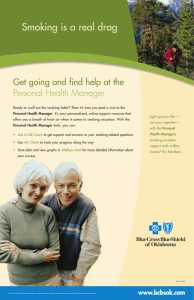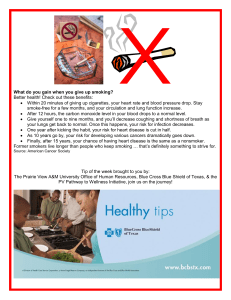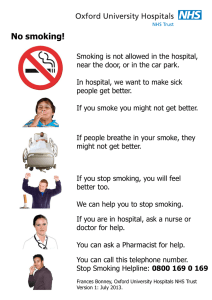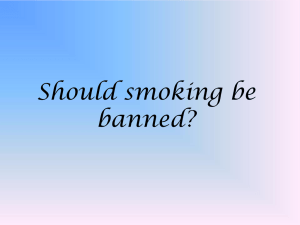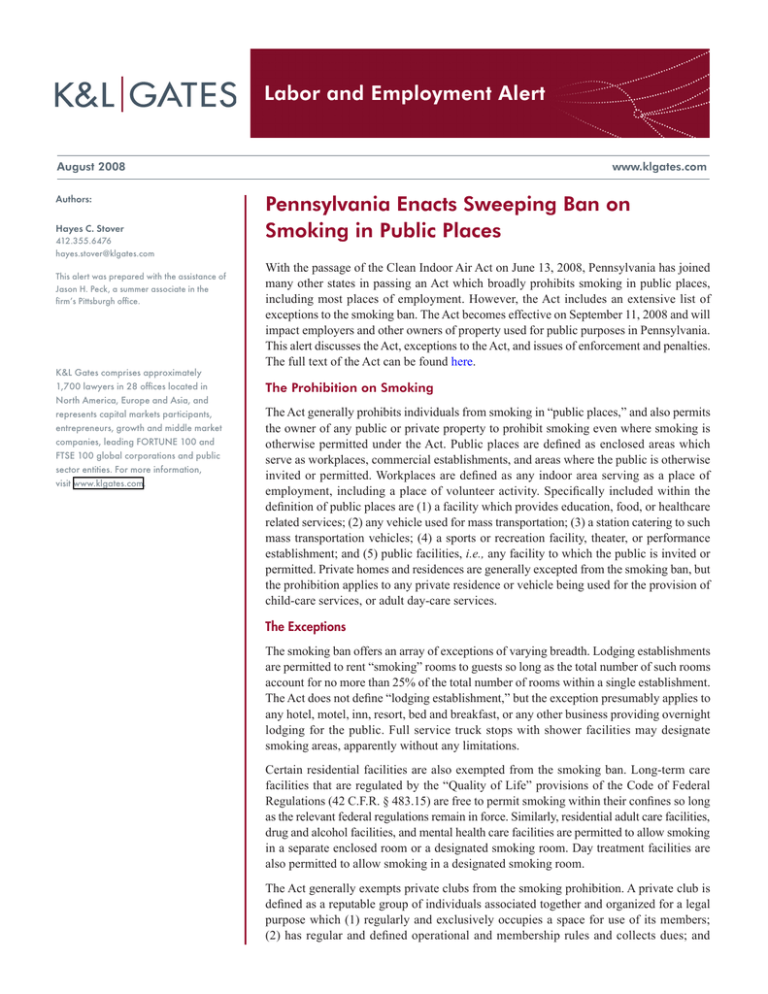
Labor and Employment Alert
August 2008
Authors:
Hayes C. Stover
412.355.6476
hayes.stover@klgates.com
This alert was prepared with the assistance of
Jason H. Peck, a summer associate in the
firm’s Pittsburgh office.
K&L Gates comprises approximately
1,700 lawyers in 28 offices located in
North America, Europe and Asia, and
represents capital markets participants,
entrepreneurs, growth and middle market
companies, leading FORTUNE 100 and
FTSE 100 global corporations and public
sector entities. For more information,
visit www.klgates.com.
www.klgates.com
Pennsylvania Enacts Sweeping Ban on
Smoking in Public Places
With the passage of the Clean Indoor Air Act on June 13, 2008, Pennsylvania has joined
many other states in passing an Act which broadly prohibits smoking in public places,
including most places of employment. However, the Act includes an extensive list of
exceptions to the smoking ban. The Act becomes effective on September 11, 2008 and will
impact employers and other owners of property used for public purposes in Pennsylvania.
This alert discusses the Act, exceptions to the Act, and issues of enforcement and penalties.
The full text of the Act can be found here.
The Prohibition on Smoking
The Act generally prohibits individuals from smoking in “public places,” and also permits
the owner of any public or private property to prohibit smoking even where smoking is
otherwise permitted under the Act. Public places are defined as enclosed areas which
serve as workplaces, commercial establishments, and areas where the public is otherwise
invited or permitted. Workplaces are defined as any indoor area serving as a place of
employment, including a place of volunteer activity. Specifically included within the
definition of public places are (1) a facility which provides education, food, or healthcare
related services; (2) any vehicle used for mass transportation; (3) a station catering to such
mass transportation vehicles; (4) a sports or recreation facility, theater, or performance
establishment; and (5) public facilities, i.e., any facility to which the public is invited or
permitted. Private homes and residences are generally excepted from the smoking ban, but
the prohibition applies to any private residence or vehicle being used for the provision of
child-care services, or adult day-care services.
The Exceptions
The smoking ban offers an array of exceptions of varying breadth. Lodging establishments
are permitted to rent “smoking” rooms to guests so long as the total number of such rooms
account for no more than 25% of the total number of rooms within a single establishment.
The Act does not define “lodging establishment,” but the exception presumably applies to
any hotel, motel, inn, resort, bed and breakfast, or any other business providing overnight
lodging for the public. Full service truck stops with shower facilities may designate
smoking areas, apparently without any limitations.
Certain residential facilities are also exempted from the smoking ban. Long-term care
facilities that are regulated by the “Quality of Life” provisions of the Code of Federal
Regulations (42 C.F.R. § 483.15) are free to permit smoking within their confines so long
as the relevant federal regulations remain in force. Similarly, residential adult care facilities,
drug and alcohol facilities, and mental health care facilities are permitted to allow smoking
in a separate enclosed room or a designated smoking room. Day treatment facilities are
also permitted to allow smoking in a designated smoking room.
The Act generally exempts private clubs from the smoking prohibition. A private club is
defined as a reputable group of individuals associated together and organized for a legal
purpose which (1) regularly and exclusively occupies a space for use of its members;
(2) has regular and defined operational and membership rules and collects dues; and
Labor and Employment Alert
(3) has been in continuous existence for a period of ten
years. Also considered as private clubs are volunteer
ambulance services; volunteer fire companies; and
volunteer rescue companies. To permit smoking, the
club must take and record a vote under its bylaws
addressing smoking within the club’s facilities.
Smoking, however, is still prohibited when the club
is open to the public for a club-sponsored event, and
when the club leases or otherwise uses its facilities for
a private event that is not club-sponsored and does not
otherwise fit within any exceptions.
Gaming floors of Pennsylvania Gaming Control Board
licensed slot machine facilities are permitted to allow
smoking. This exception only applies to the gaming
floor itself, and does not cover any adjacent areas.
Further, operators must initially limit smoking to no
more than 25% of the gaming floor. This area may be
expanded, however, if the operator requests a report
from the Department of Revenue that establishes that
the average gross terminal revenue per slot machine
unit within the designated smoking area exceeds the
average gross terminal revenue per slot machine in the
non-smoking area. The operator may increase the size
of the designated smoking area in proportion to the
percentage difference in revenue, with the total area
of the smoking section not exceeding 50% of the total
area of the gaming floor.
The smoking ban provides other exceptions. Most
notably, an establishment (excluding nightclubs) with
a liquor or eating place license from the Liquor Control
Board, whose revenue from food sales comprises no
more than 20% of its combined gross sales, and which
does not allow admittance to those under 18 years of
age, is exempted. Establishments that are so licensed,
but do not meet the 20% threshold, may still permit
smoking in an enclosed area so long as the area is
separate from the dining room, has its own air system,
the revenue from food sales in the enclosed area does
not exceed 20% of the combined gross sales within
the smoking area, and the area is in existence on the
effective date of the Act. In order to be exempt, a
drinking establishment, cigar bar, or tobacco shop must
submit evidence to the regulating department that it
meets the exception criteria.
Among the remaining exceptions are cigar shops
and bars; manufacturers, importers, and retailers of
tobacco products; fundraising events for nonprofit
and charitable organizations which meet specific
criteria; and designated outdoor (i.e., open air but
still within the confines of the facility) smoking areas
within sports or recreational facilities, theaters, or other
performance establishments.
Violations and Defenses
Failure to post required signage indicating whether
or not an establishment regulated by the Act is
smoke-free; permitting smoking in non-exempted
public places; and smoking in public places where
smoking is prohibited, all constitute violations of the
Act. Employers may not refuse to hire applicants, or
retaliate against or discharge employees, who choose
to exercise a right to a smoke free environment where
required by the Act.
Entities accused of violations have two affirmative
defenses available. First, the owner, operator or manager
of the facility will not be held liable when a lessee
(an undefined term) is in actual control of the public
place when the violation occurred. Second, owners,
operators or managers may also escape liability by
showing that they made a good faith effort to prohibit
smoking on their premises. To assert either affirmative
defense, the accused must submit an affidavit detailing
information relevant to the defense to the enforcement
body which is processing the complaint. There are
no enumerated defenses for an individual cited for
smoking in violation of the Act.
Enforcement and Penalties
A complaint concerning any violation of the Act may be
made to the Pennsylvania Department of Health. Where
a facility is subject to licensure by the Commonwealth,
the appropriate licensing agency may process the
complaint. Counties may elect to permit their local
board of health to enforce the smoking ban rather than
rely upon the Pennsylvania Department of Health.
Finally, complaints may be filed with the Pennsylvania
State Police or local law enforcement agencies. A
complaint will trigger an investigation and possible
enforcement proceedings. Drinking establishments,
cigar bars, and tobacco shops also subject themselves
to particularly intrusive investigations, as they are
required to make available to the Pennsylvania
Department of Health or other enforcement agencies
all books, accounts, revenues, receipts, and any other
information relevant to enforcement.
Violations of the Act are punishable by monetary
administrative penalties payable to the Department
of Health, the relevant state agency, or county agency.
August 2008 | 2
Labor and Employment Alert
A “person” who violates the Act is subject to a fine
not exceeding $250 for the first offense. Should the
same person violate the Act for a second time within
one year of his/her first violation, the maximum fine
increases to $500. A third (and subsequent) violation
within a year of a person’s second violation subjects
that person to a fine of no more than $1,000.
Violation of the Act is also characterized as a summary
criminal offense, thereby subjecting individuals to
the same fine structure as under the administrative
penalties. The summary offense procedures are those
to be used by law enforcement agencies.
Local Options
The Act, as currently written, preempts any local
ordinances, resolutions, or regulations concerning
smoking in public places, with the exception of the
current non-smoking laws of the city of Philadelphia.
This state of affairs, however, may change as the
Pennsylvania legislature has agreed to consider
permitting Allegheny County and the city of Scranton
to re-enact their past non-smoking measures. In all
three locales, the present or defunct non-smoking laws
provide for much stricter regulation than provided by
the Act.
Issues
The Department of Health is directed to issue
regulations implementing the Act. When issued, these
regulations may clarify some of the following issues.
1. T he Act imposes its requirements on an
“owner, operator or manager.” However, the
fines, whether administrative or criminal,
are against any “person” who violates the
Act. The term “person” is not defined in the
Act. It would appear that either the entity or
the responsible individual may be fined. It
is unclear whether both may be fined for the
same violation.
2. I t is unclear whether violators may be
subjected to administrative penalties and
criminal fines for the same violation. That is
unlikely, given the separation of enforcement
agencies between the civil and criminal, with
the criminal system simply being a tribunal for
law enforcement agencies that do not have a
civil enforcement mechanism available.
3. I t is unclear how the employment nondiscrimination provision will be enforced. The
fine structure appears to be applicable only
to smoking violations. On the other hand, no
enforcement provision is specified for the nondiscrimination provision. It is possible that a
private right of action in a state court may be
implied under the public policy exception to
employment at will.
4. Employers with a unionized work force must
enforce the ban as applicable. However, how
the ban is enforced in a workplace is in many
instances a mandatory subject of bargaining
with the union.
5. T he Act does not appear to contain an
exception to allow an employer to create any
indoor area where employees may smoke.
Conclusion
The Act culminates many years of efforts by many
individuals to ban smoking in public places, and brings
Pennsylvania into line with many other states. The Act,
however, will result in substantial changes in many
places and in the habits of many individuals. We will
continue to monitor the Act and its implementation and
provide updated Alerts as appropriate.
August 2008 | 3
Labor and Employment Alert
K&L Gates comprises multiple affiliated partnerships: a limited liability partnership with the full name K&L Gates LLP qualified in Delaware and
maintaining offices throughout the U.S., in Berlin, in Beijing (K&L Gates LLP Beijing Representative Office), and in Shanghai (K&L Gates LLP Shanghai
Representative Office); a limited liability partnership (also named K&L Gates LLP) incorporated in England and maintaining our London and Paris
offices; a Taiwan general partnership (K&L Gates) which practices from our Taipei office; and a Hong Kong general partnership (K&L Gates,
Solicitors) which practices from our Hong Kong office. K&L Gates maintains appropriate registrations in the jurisdictions in which its offices are
located. A list of the partners in each entity is available for inspection at any K&L Gates office.
This publication/newsletter is for informational purposes and does not contain or convey legal advice. The information herein should not be used or
relied upon in regard to any particular facts or circumstances without first consulting a lawyer.
Data Protection Act 1998—We may contact you from time to time with information on K&L Gates LLP seminars and with our regular newsletters,
which may be of interest to you. We will not provide your details to any third parties. Please e-mail london@klgates.com if you would prefer not to
receive this information.
©1996-2008 K&L Gates LLP. All Rights Reserved.
August 2008 | 4

